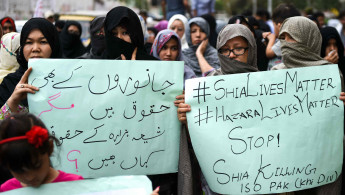Pakistani Shia Hazara minority end days-long protest in Quetta over militant attacks
Pakistan's minority Shia Muslims have ended their days-long sit-in after successful talks with the government, which promised more steps to protect them in the southwestern city of Quetta following a suicide bombing there last week.
Members of the Hazara community ended their protest before dawn Tuesday.
Hundreds of Shias began their protest Friday after the suicide bombing at an open-air fruit market killed 20 people, with eight Hazaras were among the victims.
The bombing was claimed by Islamic State group, which views Shias as apostates deserving of death.
Pakistani officials deny the Islamic State group is present in the country, but the group has claimed a number of attacks in the past.
Ethnic Hazara make up most of the Shia population in Quetta, the capital of southwestern Balochistan province - the country's largest and poorest region, rife with ethnic, sectarian and separatist insurgencies.
Balochistan is the scene of a low-level insurgency by separatists demanding more autonomy and a greater share in the region's natural resources such as gas and oil.
The Hazara peoples' Central Asian features make them easily recognisable and they are a soft target for Sunni militants, who consider them heretics.
They are so frequently targeted they are forced to live in two protected enclaves in the city and are given a daily police escort to the market to stock up on supplies.
Follow us on Twitter: @The_NewArab





 Follow the Middle East's top stories in English at The New Arab on Google News
Follow the Middle East's top stories in English at The New Arab on Google News


